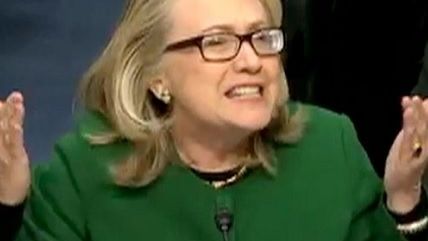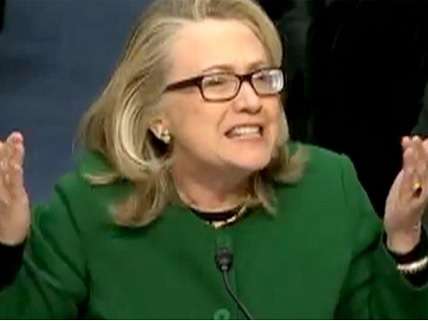Benghazi Report Reveals Folly of Interventionism
Partisanship provides cover.


The House Benghazi select committee released its five-part 800-page report on the September 11, 2012 attacks on the U.S. mission in Benghazi, with an "additional views" addendum from Reps. Jim Jordan (R-Ohio) and Mike Pompeo (R-Kan.) that blamed President Obama and Hillary Clinton, who was secretary of state at the time, more directly for the various intelligence, security, and communications failures that led to the attack and misinformation in the aftermath about the existence of protests against a YouTube video that sparked the violence.
Democrats, who accused Republicans of "wasting taxpayers money" on an issue that's been investigated by the executive branch, and Congress, multiple times, released their own report. Democrats insist the select committee was a political ploy to sully Clinton, the presumptive Democratic nominee, ahead of the November elections. "There seems to be only one remaining question," White House Press Secretary Josh Earnest said today. "It's simply this. Is the RNC going to disclose the in-kind contribution they received from House Republicans today?" They're probably even after the Democrats' kabuki sit-in against civil rights, off which they raised money directly.
The partisan argument about Clinton's culpability in an attack that led to the killing of four Americans by Libyan militants misses the broader argument about aimless interventionism. A spokesperson for the State Department responded to the report by saying the department's "priority continues to be carrying out our national security mission while mitigating the risks to our employees." Democrats insist the State Department has boosted security, so the problem is solved. Republicans argue the White House didn't do enough militarily (in one part of the report referring to Obama's "no boots on the ground" policy as having informed the immediate response to the Benghazi attack), and often believe the answer is more military spending and "boots on the ground."
The reality is the U.S. should not have participated in the Libyan civil war in the first place, and certainly the Obama administration should not have committed forces before getting approval from Congress. None of the investigative reports I've seen tackled that question. The select committee reports that Ambassador Chris Stevens, among the four killed in Benghazi, had been charged with preparing the mission there to be converted to a permanent consulate, so as to offer a "deliverable" for Clinton's planned October 2012 visit to Libya. Today Clinton insists the fault with the Libyan intervention lies in the Libyan government, for not permitting foreign security to operate in Libya, on the political fallout from the Benghazi attack itself. President Obama has expressed regret at the aftermath of the Libyan intervention multiple times, calling it the "worst mistake" of his presidency. Clinton insists it's still an opportunity for more U.S. involvement in affairs around the world.
The report also focused on the misinformation surrounding the role of a trailer for a Mohammed movie on YouTube in sparking protests that terrorists may have taken advantage of. There appear to have been no protests in Benghazi prior to the attack and at least one report was based on an article about planned protests that was published a week before the protests happened. Some officials are quoted as being in shock about national security advisor Susan Rice's infamous Sunday morning appearances about Benghazi. But the administration's lies were as plain as day to anyone bothering to follow the news during and after Benghazi. The story started unravelling pretty quickly. There was a clear campaign to deflect what happened in Benghazi as a failure of U.S. policy onto a YouTube video and the practice of free speech. There were protests around the Muslim world on September 11, 2012, some focused on the perceived slight to Mohammed, others on U.S interventionism. The ease with which Clinton appears to be able to avoid substantive criticism of unchecked interventionism ("what difference, at this point, does it make?") is as frustrating as the failure by many to see her as the foe of free speech that she has reliably been as well.


Show Comments (77)